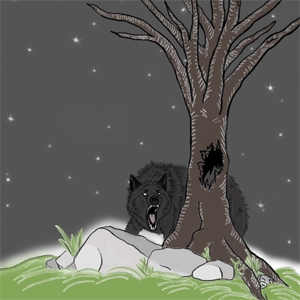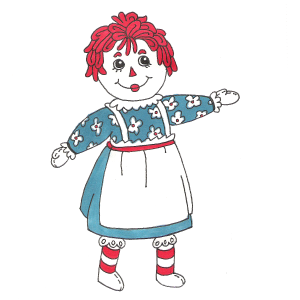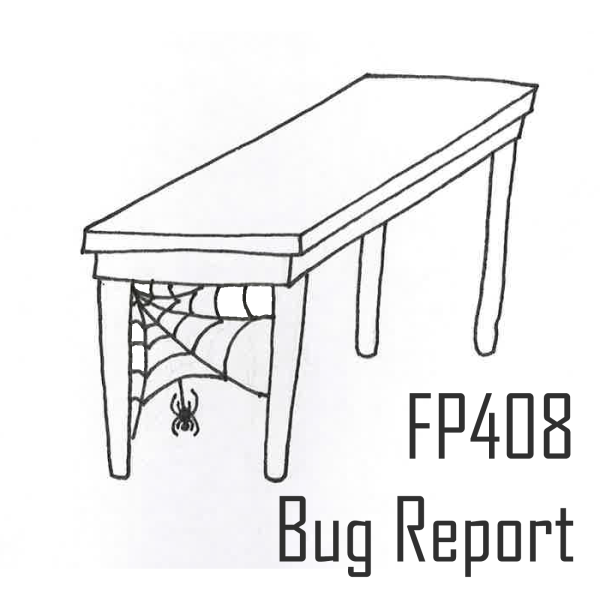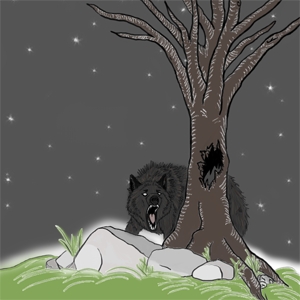Welcome to Flash Pulp, episode four hundred and nine.
 Tonight we present Chum
Tonight we present Chum
[audio:http://traffic.libsyn.com/skinner/FlashPulp409.mp3]Download MP3
(RSS / iTunes)
This week’s episodes are brought to you by The Melting Potcast
Flash Pulp is an experiment in broadcasting fresh pulp stories in the modern age – three to ten minutes of fiction brought to you Monday, Wednesday and Friday evenings.
Tonight we present a tale of summer miscreancy and the unexpected phantasms of childhood.
Chum
Written by J.R.D. Skinner
Art and Narration by Opopanax
and Audio produced by Jessica May
The twelve-year-olds, Chuck and Grim Tom, were sitting on the splinter-filled bench that ran the length of the camp’s convenience store. They were sipping Dr. Peppers.
“Ain’t nothing interesting ever happen here,” Chuck was saying, his can already half empty.
Grim Tom smiled.
“That’s not true, there was that time the Gupta’s trailer caught fire, and the pig roast is tonight,” he replied, his can still half full.
Filmore Park, Capital City’s finest – or at least nearest – RV site, spread out from their perch. To the left, just behind the sparklingly-clean Canyon Stars of Filmore’s jetset, was a hilltop view of Lake Pichimonga. The hill itself was beset with jagged stones, inhabitable only by stubs of persistent grass, ensuring the richest campers prime scenery without disruption from the rabble.
To the right, down the sloping road that cut through the more tightly-packed sprawl, lay the small dock, the swings, and the hurly burly surrounding the boys’ own modest motorhomes.
Grim Tom had befriended Chuck during the first summer either had spent visiting the park. Now, after three seasons of water fights, preteen politics, and fireside crushes, they felt as if they had spent their entire lives scaling the moss-covered boulders and roaming the woods surrounding the rows of electrical outlets.
Finishing his soda with an extended slurp, Grim Tom lobbed the tin husk towards the recycling barrel and turned to witness the approach of a distant engine.
From beyond the corner of the store came the largest RV either youth had ever encountered. Its towering white walls seemed to bulge under their own weight, but every surface wide enough to contain a window had been converted into an expanse of glass.
Its flat nose provided a clear view of the clean-cut man behind its wheel.
“Huh,” said Chuck.
“Yeah, I’ve never seen a rolling shack like that,” answered Tom.
For a moment the stranger smiled, and it appeared to the boy as if the newcomer’s mouth was filled with rows of off-white spines, like porcupine quills, but then his lips closed to a tight smirk and the child knew it must have been a trick of the light.
As it passed, the vehicle moved through a slow turn, giving ample time to visually pry at the tautly-curtained windows that ran along its flanks. By the time it had claimed a prime spot overlooking the lake, they had seen little enough to have their curiosity roaring.
Grim Tom settled back on the bench, saying, “so much for nothing interesting ever happening.”
He smirked as he spoke, but the smile dropped away when his friend returned to a topic that would not remain buried.
“Okay then,” replied Chuck, “let’s see what’s inside THAT one.”
Chuck’s goal for the summer had revealed the afternoon of their first reunion of the season. They’d been inspecting the crayfish stocks in Miller’s Stream, the management of which they took to be a serious matter, and Charles had recounted his plan in short sentences while hopping along the stream’s archipelago of time-flattened boulders.
Alison Piper, Chuck’s quasi-girlfriend the year previous, had often proven her courage to her companions by pulling open the screen doors of darkened campers and rooting around in their fridges. On occasion she also brought back tales of booze bottles lying about or rubber penises left in the open, and these had gone far to draw on Chuck’s affections. To Tom, there’d never been any malice in the acts, only bravado, but he’d done his best to discourage the trespassing nonetheless.
He’d been less than thrilled when Chuck had begun to talk of the Grimaldi’s mammoth Zephyr as the Everest of such endeavours.
It was true that the trailer was the largest in the makeshift neighourhood, but Mr. Grimaldi was also one of its most ornery inhabitants. It would not go well for the burglars if they were caught munching down cold hot dogs from his mini-fridge.
Sauntering towards the edge of the convenience store’s porch, Grim Tom said, “give it up, I ain’t going to prison for any icy weiners.”
“They won’t send you to prison,” replied Chuck, who stood to follow, “they won’t know we were there! Even if we were caught, though, they’d just give us a talking to. It’s not like we’re stealing anything. Besides, they’re strangers who wouldn’t recognize us. Anyhow, they’ll be at the pig roast tonight for sure, right? That’s probably why they came, so we can sneak in then, easy peasy.”
On those few occasions when Grim Tom had been caught out by his strong-fingered mother, he knew it was usually one of Chuck’s arguments-by-avalanche that got him there. He was not willing to surrender the fight.
“Look at that monster, it has cost more than old man Filmore paid for the land itself. Any time they leave it’ll be locked tighter than your mom’s undies.”
“That’s when we use the glass hammer!”
Tom groaned. The window breaker, plucked from a roadside safety kit Chuck’s grandfather had given him after buying an upgrade for his big rig, had been the boy’s other obsession of the summer.
“They’ll definitely toss us in the clink then,” said Grim.
“Screw that,” replied Chuck. “It’s like what Dad said when he took wood from the Grimaldi’s pile over the spring – if they can afford that monster they can afford some new lumber – or, in this case, a new window.”
Though it had not been either’s intention, their wandering feet, guided by nothing more than the usual patterns of patrol they fell into when strolling the park, had carried them across the unfamiliar vehicle.
Most of the curtains were still firmly drawn, but, midway along its rounded exterior, the upper half of a dutch door had swung inward. A woman, perhaps only slightly younger than the driver, stood at the open portal.
She was blond, though Grim Tom thought he caught a hint of pastel pink and blue shimmering at the ends of her sweeping ringlets, and she wore a shimmering yellow blouse that seemed to float, barely there, about her shoulders. Her flesh was pale, her chin a gentle point, and it was apparent, as the silk shifted on her slight frame, that she wore no bra.
It was only when she chuckled that the youths realized they were staring. With red faces they wheeled, returning the way they had come at twice the pace of their approach.
“I definitely don’t want to go in there now,” said Tom.
“I’m definitely going in there now,” replied Chuck.
 The argument continued for seven hours. It was debated on the swings; it was discussed as pocket knives hacked at pine branches intended for their fort’s roof; it was argued at length under the stars and over marshmallow roasting sticks.
The argument continued for seven hours. It was debated on the swings; it was discussed as pocket knives hacked at pine branches intended for their fort’s roof; it was argued at length under the stars and over marshmallow roasting sticks.
In the end, as the adults’ tinny rock music blared from the beach on the far side of the grounds, Grim Tom maintained he was only there to stop Chuck from going too far.
He claimed too far was even approaching the RV, and then he claimed too far was tugging at the transparent plastic door of the main entrance.
There was no time for him to mention that it was too far before Chuck’s hammer landed.
As the tool arced overhead, however, Tom did see the full length of the door swing wide, revealing the strangest sight his young mind had ever attempted to process.
Here was the man, no longer wearing the light blue polo shirt he’d driven in with. His mouth was agape, and he did, in fact, have a double row of spines for teeth, their heights irregular and their caps ending in jagged splinters.
The blond woman was also there, also topless, her sleepy eyes peering over his right shoulder.
To the left, another set of eyes looked on from beyond the corner of the entrance’s lower half. Tom knew it to be a child, but it barely registered. The lack of legs was all he could truly focus on: The lower halves of both male and female, just below the gently fanning slits that murmured along their ribs, were made up of nothing more than large fish tails.
Then the hammer landed, and both boys were thrown back by the sudden flood of water that shot from the shattered door. The tide was too much for the mer-family as well, and the flow carried them roughly down the iron steps – apparently largely ornamental – and onto the campground dirt.
Standing, Grim Tom took in the trio of fish folk, their fins glimmering under the stars like the surface of the Pichimonga down the barren and rocky slope, and said, “I am SO sorry.”
“Yes! Outside!” giggled the child, now obviously also tailed, and no older than four by human reckoning.
“Oh no,” answered his apparent mother. She began to crawl to his side.
“Five minutes at most and we’ll be drown,” the father shouted in her direction, panic in his voice.
Given the woman’s gasping breaths, Tom suspected she already knew.
Grim’s gaze tracked to the horizon. “Could the Pichimonga keep you alive? What if we dragged – uh, I mean, helped you into it?”
Flopping over, so that he might see his attacker, the father’s face was drawn tight with anger, but he seemed to know too well that he had little time to accuse or argue.
“The hell did you think you were doing!? No, nevermind.
“Yes the lake would be grand, but the stones and the distance are too much – we’ll be gutted or dried up before we get there. You’re onto something though. Get your hands about my munchkin and get him inside.”
Together Chuck and Tom were able to lift the child inside, then helped hoist the mother, her gooey skin appearing human but feeling more fish, and pulled the father across the black iron steps.
Inside, the table and benches, the couch and counters, the kitchenette and shelves: All was plastic except the plush bedding across their sleeping pads. The flooring was nothing more than a collection of pleasantly coloured stones never intended to be stepped upon.
“I can’t lift myself to operate the gas. I can turn us left, towards the slope, but you’ll have to push us in,” announced the man, his spines flashing as he spoke.
The child had taken to crying now, the novelty of his freedom having fled, and the mother held him across her scaly lap, cooing soft songs between which she gulped uselessly at the air.
“I’m sorry too,” said Chuck, too in a hurry to wait for a reply, and the humans departed to set their legs into the act of shoving.
There was a brief second in which Tom suspected the man might just be lying, and might, in fact, have intended to throw the RV in reverse and flatten the pair of intruders. Instead, the red blinkers flared, and it began to roll forward at a gentle pace.
With mighty grunts, the boy’s splayed hands imparted every ounce of momentum they could muster and the behemoth began to move at a greater pace. Tom could not tell if it had been five minutes, all told, when they watched the rear of the beast slide over the lip and begin its descent.
He guessed it a jarring ride, if the bumping and thrashing of the tail lights were any indication, but it somehow remained upright as it coasted over the rocks that marked the shoreline and into the drop off beyond.
Only the topmost of the roof, and the dual beams of its headlights, remained to mark its landing place against the darkness of the water.
Of course, the unexpected plummeting of such an expensive investment was noticed immediately by the adults partying a few hundred yards down the shoreline. A running crowd met Grim Tom and Chuck as they strolled, in a daze, towards their summer homes.
Endless suspicion flowed around the duo’s culpability in the gossip that followed them till the year’s close – but, strangely, no one ever came forward to claim the vehicle as their own, and, once fished from the water, no evidence of ownership, nor even bodies, were found within.
The motorhome was not the last item to be cast into the lake that season, however: Chuck’s hammer soon followed.
Flash Pulp is presented by https://www.skinner.fm, and is released under the Creative Commons Attribution-Noncommercial 3.0 Unported License.
Intro and outro work provided by Jay Langejans of The New Fiction Writers podcast.
Freesound.org credits:
Text and audio commentaries can be sent to comments@flashpulp.com – but be aware that it may appear in the FlashCast.
– and thanks to you, for reading. If you enjoyed the story, tell your friends.
Tonight we present Doll
 Though Cassandra hoped she might again come and say hello, the woman disappeared into the shadows beside the Washeteria laundromat.
Though Cassandra hoped she might again come and say hello, the woman disappeared into the shadows beside the Washeteria laundromat.
 The argument continued for seven hours. It was debated on the swings; it was discussed as pocket knives hacked at pine branches intended for their fort’s roof; it was argued at length under the stars and over marshmallow roasting sticks.
The argument continued for seven hours. It was debated on the swings; it was discussed as pocket knives hacked at pine branches intended for their fort’s roof; it was argued at length under the stars and over marshmallow roasting sticks.
 The Melancholy, as it came to be called, was thus well known to the Corosians – although, as the coverage spread into rumours that cases of infection had carried beyond the perimeter of the quarantine, the isle’s inhabitants took some comfort, in the thankful moments of their kitchen table prayers, that there was an ocean between their families and the troubles.
The Melancholy, as it came to be called, was thus well known to the Corosians – although, as the coverage spread into rumours that cases of infection had carried beyond the perimeter of the quarantine, the isle’s inhabitants took some comfort, in the thankful moments of their kitchen table prayers, that there was an ocean between their families and the troubles. “I wouldn’t talk,” replied the cop, “you have exactly two collared shirts, and one doesn’t really fit anymore. You only have the other because you won’t stop going to job interviews that will never hire a high-grade dumbass such as yourself.”
“I wouldn’t talk,” replied the cop, “you have exactly two collared shirts, and one doesn’t really fit anymore. You only have the other because you won’t stop going to job interviews that will never hire a high-grade dumbass such as yourself.” Staggering to the kitchen he found the latest calamity.
Staggering to the kitchen he found the latest calamity. Even the crowd seemed engaged by the girl’s intensity, and a hush fell over all – all except the coffee soaked man in the white polo who was still waiting on her father’s apology. In the silence Dad’s “d-d-d-d-d-didn’t” carried clearly to the plate, as did the exasperated reply of “Jesus, talk normally,” from the Medusa fan.
Even the crowd seemed engaged by the girl’s intensity, and a hush fell over all – all except the coffee soaked man in the white polo who was still waiting on her father’s apology. In the silence Dad’s “d-d-d-d-d-didn’t” carried clearly to the plate, as did the exasperated reply of “Jesus, talk normally,” from the Medusa fan. He remembered terrible dreams – something about Hillary trying to scratch at his eyes – and could even feel where he’d reflexively set his palms to his cheeks to save his sight.
He remembered terrible dreams – something about Hillary trying to scratch at his eyes – and could even feel where he’d reflexively set his palms to his cheeks to save his sight.